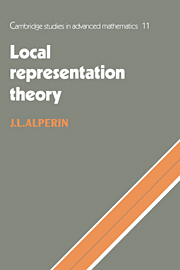 Local Representation Theory
Local Representation Theory V - Cyclic blocks
Published online by Cambridge University Press: 12 January 2010
Summary
We have now amassed the ideas needed to develop one of the deepest and most important parts of representation theory: the structure theory of blocks with cyclic defect groups. We have already looked at groups with cyclic normal Sylow p-subgroups and at SL(2, p) and achieved complete information about the structure of projective modules; we shall now do the same for any block with a cyclic defect group. This theory is one of the triumphs of the subject and, at the same time, the biggest challenge, in that the main problem is to generalize these results to theorems about arbitrary blocks.
Brauer trees
The structure of a block with a cyclic defect group is remarkably determined by the properties of a graph which is associated with the block. In fact, it is not just a graph, but a Brauer tree, which is a graph with some additional structure. A Brauer tree is defined as a finite, connected, undirected graph without loops or cycles (so it is a tree) together with two additional structures: a circular ordering of the edges emanating from each vertex; the assignment of a positive integer, called the multiplicity, to one of the vertices, called the exceptional vertex.
This requires some elucidation. The property of being a tree means there is no path in the graph, starting and ending at the same vertex but passing over a set of distinct edges, each just once.
Information
- Type
- Chapter
- Information
- Local Representation TheoryModular Representations as an Introduction to the Local Representation Theory of Finite Groups, pp. 118 - 173Publisher: Cambridge University PressPrint publication year: 1986